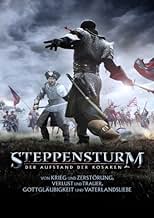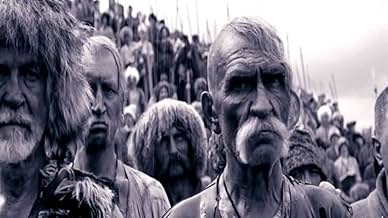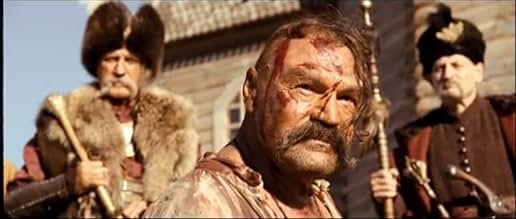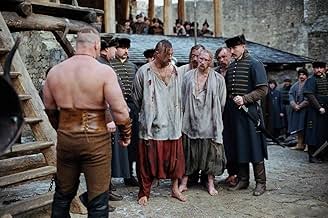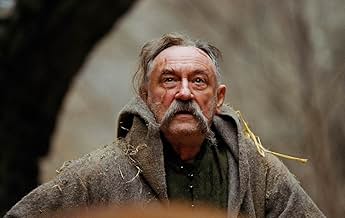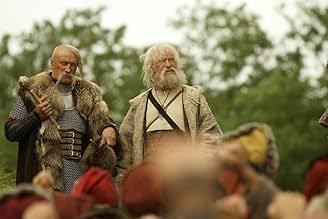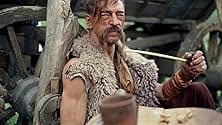PUNTUACIÓN EN IMDb
5,7/10
3,6 mil
TU PUNTUACIÓN
Tarás Bulba, el líder cosaco zapórogo y su campaña para defender su tierra del avance del ejército polaco a comienzos del S. XVI.Tarás Bulba, el líder cosaco zapórogo y su campaña para defender su tierra del avance del ejército polaco a comienzos del S. XVI.Tarás Bulba, el líder cosaco zapórogo y su campaña para defender su tierra del avance del ejército polaco a comienzos del S. XVI.
- Dirección
- Guión
- Reparto principal
- Premios
- 5 premios y 3 nominaciones en total
Yury Belyayev
- Koshevoy Kirdaga
- (as Yuriy Belyaev)
Sergey Dreyden
- Yankel - the Jew
- (as Sergey Dontsov)
Alim Kouliev
- Cossack Moisei Shilo
- (English version)
- (voz)
Liubomiras Laucevicius
- Polish Duke
- (as Liubomiras Lauciavicius)
Reseñas destacadas
Unfortunately, this version of the great classic does not do it great justice. Bohdan Stupka's great performance does not elicit much response in either Vladimir Vdovichenkov as the brave Ostap or Igor Petrenko as the tragically star-struck Andrii. Partly, this looks like a poor script as the lines follow just too closely the original text of Gogol. Partly, this goes to the director's focus which was far more on the settings than dialogues, except when delivering propaganda one-liners a la Eisenstein or Dovzhenko.
Overall, this version of Taras Bulba seems just too much of an agitprop forthe new Cossack village creed of militant Russian patriotism and pride in martial traditions of the legendary steppe marauders which finds its natural outlet in heavy drinking and voting loyalty to Yedinaya Rossija.
Overall, this version of Taras Bulba seems just too much of an agitprop forthe new Cossack village creed of militant Russian patriotism and pride in martial traditions of the legendary steppe marauders which finds its natural outlet in heavy drinking and voting loyalty to Yedinaya Rossija.
I mostly agree with comments posted previously by other viewers, about the permanent propaganda-style used in longish and unrealistic patriotic speeches. I translated the movie into French and English subtitles to add on divx (they will be available soon on OS) and I got quickly bored by the seeming repetitiveness of several speeches. Beingmarried to a Ukrainian lady, I'm also very much aware that Bortko had to kinda "steal" the true story and replace it by Russian propaganda. Just have a look at who's at the steering wheel in Russia, now ! My feeling is that this movie was sponsored by Russian public funds for the "nashy" and their followers.
this is a good and hard movie for humans who know Russian history.5.5 is the IQ of the stupid who don't know noting.you must read to know something .if this movie is made by Americans his note will be 10,but is not,is made by Russian.i read the novel and all Russian history and this movie is an great example for the MAN who don't know nothing.the main character is the example of old school hero and patriot not some pussy whit a gun,a father and men .the Russian history is made whit blood and steal not oil wars.my apologize if i was to rude but not all the great movies are made by Americans.i am from Romania and we to make great movie like:MICHAEL THE BRAVE,VLAD THE IMPAILER,MIRCEA,OSANDA
Bogdan Stupka. in fight to create a credible Taras. a literary gem. who becomes a political tool. that is all. the film has a lot of sins but the basic problem is the ambition to create a Hollywood blockbuster as support for the Kremlin 's interest. the fragile beauty of the book is lost. the Kozaks becomes Russian puppets. the Pole society is victim of a Manicheism who not convince and not impress. the entire story becomes an aggressive political speech. sure, many historical films from the East Europe are illustrations of the same recipes. but under the Communism regime. and the delicate problem is to transform Ukraine in a part of Russia, to use special effects for ignore the senses of book, to destroy a noble idea for a not real decent result. short, a Russian story. full of nationalism. and not convincing . useful for a kind of public . and not more that.
Bortko set out to make an apparent epic here, but sadly, missed an opportunity to tell a great story. I researched Gogol before watching this film; the essence of the story is covered in the film's plot. What Gogol did NOT include was the Russian polemic which slaps you in the face at every turn in this film.
I agree with some of the other reviewers that casting and costuming were great! Fabulous actors, wonderful faces, but a sodden, leaden, boring script deprived them of a chance to display their true talent. Bogdan Stupka is always a pleasure to watch, and for a better version of these times, watch Hoffman's 1999 Polish epic "Ogniem i mieczem", in which Stupka plays Bogdan Khmelnitski.
The patriotic speeches, both in the sich and during the battle death scenes, slowed the movie to a dead crawl (no pun intended!) and greatly detracted from the film's impact. As others have noted, this is truly a Ukrainian story, not a Russian one. Ukraine was mentioned only twice in the movie (I counted). Endless speeches (particularly with a slit stomach) about the sacred Russian soil really have no place in a story about Polish/Ukrainian struggles, and only serve to underscore that the film's budget was heavily subsidized by the Russian government. At a time when the East and West need to work together to solve this world's problems, western xenophobia seems highly counterproductive. Such films only widen the divide and hurt us all as creatures of this planet.
One note about the score: nice idea again, but endlessly repetitious. I recognized in the main theme a variation of a famous Ukrainian carol "Novo radist stala", which I have sung many times, but it was extremely overdone. A little variation would have been nice. The repetitive score reminded me of another score for Bortko's "The Idiot", a wonderful Russian serial based on the Dostoevsky novel (2003). More endless repetition of the musical theme was the one negative in an otherwise flawless ensemble of actors and a compelling story.
In summary, this film was watchable but mostly boring. Some of the horrendously violent scenes made me cross myself. Not a total waste of two hours; however, it left me feeling that it could have been so much better with a little more effort and less propaganda.
I agree with some of the other reviewers that casting and costuming were great! Fabulous actors, wonderful faces, but a sodden, leaden, boring script deprived them of a chance to display their true talent. Bogdan Stupka is always a pleasure to watch, and for a better version of these times, watch Hoffman's 1999 Polish epic "Ogniem i mieczem", in which Stupka plays Bogdan Khmelnitski.
The patriotic speeches, both in the sich and during the battle death scenes, slowed the movie to a dead crawl (no pun intended!) and greatly detracted from the film's impact. As others have noted, this is truly a Ukrainian story, not a Russian one. Ukraine was mentioned only twice in the movie (I counted). Endless speeches (particularly with a slit stomach) about the sacred Russian soil really have no place in a story about Polish/Ukrainian struggles, and only serve to underscore that the film's budget was heavily subsidized by the Russian government. At a time when the East and West need to work together to solve this world's problems, western xenophobia seems highly counterproductive. Such films only widen the divide and hurt us all as creatures of this planet.
One note about the score: nice idea again, but endlessly repetitious. I recognized in the main theme a variation of a famous Ukrainian carol "Novo radist stala", which I have sung many times, but it was extremely overdone. A little variation would have been nice. The repetitive score reminded me of another score for Bortko's "The Idiot", a wonderful Russian serial based on the Dostoevsky novel (2003). More endless repetition of the musical theme was the one negative in an otherwise flawless ensemble of actors and a compelling story.
In summary, this film was watchable but mostly boring. Some of the horrendously violent scenes made me cross myself. Not a total waste of two hours; however, it left me feeling that it could have been so much better with a little more effort and less propaganda.
¿Sabías que...?
- Curiosidades150 horses were used in the film.
- PifiasOn two occasions, it is raining in spite of the day clearly being sunny.
- Versiones alternativas"Veer" (2010)
- ConexionesReferenced in Zloy gorod (2025)
Selecciones populares
Inicia sesión para calificar y añadir a tu lista para recibir recomendaciones personalizadas
- How long is Taras Bulba?Con tecnología de Alexa
Detalles
- Fecha de lanzamiento
- País de origen
- Sitios oficiales
- Idiomas
- Títulos en diferentes países
- Iron & Blood: The Legend of Taras Bulba
- Localizaciones del rodaje
- Empresa productora
- Ver más compañías en los créditos en IMDbPro
Taquilla
- Presupuesto
- 15.700.000 US$ (estimación)
- Recaudación en todo el mundo
- 18.888.220 US$
- Duración
- 2h 11min(131 min)
- Color
Contribuir a esta página
Sugerir un cambio o añadir el contenido que falta


